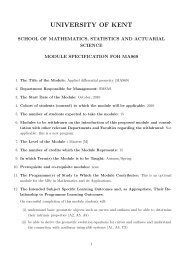cspdf, Job 181 - University of Kent
cspdf, Job 181 - University of Kent
cspdf, Job 181 - University of Kent
Create successful ePaper yourself
Turn your PDF publications into a flip-book with our unique Google optimized e-Paper software.
esponsibility’ and to work against ‘the rather dubious reputation <strong>of</strong> Greece’.<br />
‘We Greeks see [Athens 2004] as a national project’, he explained in<br />
interviews (Greece: Government, Telecommunications, Tourism). It would be<br />
easy to follow the post-modern argument here, and read this statement as<br />
Greece’s attention to superficial duties – to assume, in other words, that ‘the<br />
struggle for recognition takes place entirely at the level <strong>of</strong> appearances, in<br />
which there is no distance between recognition for looking good and for being<br />
good’ (O’Neill, 1999: 80). Yet, the coupling <strong>of</strong> moral imperatives with ‘fiscal<br />
responsibility’ is a quite interesting move by Bakouris, and demonstrates that<br />
what we have to examine are not the rules <strong>of</strong> the market economy that the<br />
Greeks must follow, but the ethical presuppositions on which Greek actors<br />
operated. We also have to examine the argument in its reverse form – that is,<br />
by placing the Greeks in the position <strong>of</strong> the recipient. If the Olympics are a<br />
‘gift’ that periodically circulates in the community <strong>of</strong> nations, their ‘donation’<br />
to Greece is a form <strong>of</strong> recognition by an international community. The idea <strong>of</strong><br />
‘giving’ generates a number <strong>of</strong> non-contractual responsibilities (on which<br />
contractual relationships are based, after all) on the part <strong>of</strong> the recipient.<br />
Olympics-as-gift institutionalise the relationship <strong>of</strong> Greece with the rest <strong>of</strong> the<br />
world, while at the same time they formalise norms <strong>of</strong> reciprocity. This means<br />
that Greek state agents are currently tied to a number <strong>of</strong> obligations in the<br />
eyes <strong>of</strong> their ‘donors’. It is interesting that the acknowledgment <strong>of</strong> their debt<br />
is coupled by assertions in which even their duty as gift-recipients is<br />
contested.
















